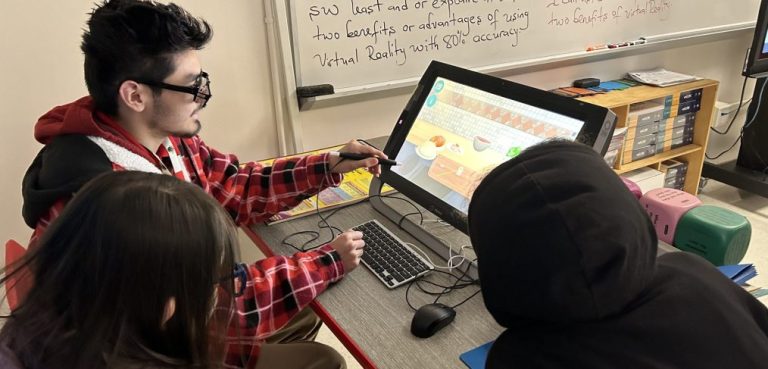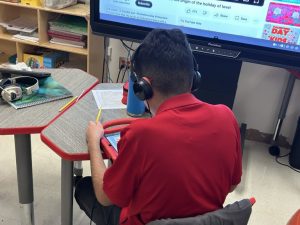Sonja Nix, assistant principal at Skyline High School, is finding creative ways for students in the special education program to learn life skills – virtual reality.
With the use of repurposed computer programs and goggles, students in Vashti Mbah’s class are learning how to follow recipes, cutting and measuring ingredients, mixing them and cooking, just like they would in a real kitchen.
“We partner with the culinary arts pathway to use their kitchen, but if the students have a catering event coming up, we can’t use it,” Mbah said. “But we have to keep teaching these skills. This is a great way to do it. The students have really taken to it.”
Virtual reality is used to teach more than just cooking as a life skill. In Caroline Gichangi’s functional life skills class, students practice driving through computer programs, reinforcing lessons and developing social skills.
“Kids are so used to interacting with phones and technology that this makes it so much easier,” Gichangi said. “Even those who don’t have reading skills can interact and advance to have a functional life. As they interact with each other.”
Nix, who oversees special education and discipline, was working on her doctoral program going through an educational technology course when she had the idea that technology—specifically augmented virtual reality—could be helpful in special education classes.
Skyline, Dallas ISD’s largest high school, has more than 300 students receiving special education services and about 80 of them are in functional skills classrooms. As far as Nix knows, Skyline is the first program to use virtual reality with SPED students in this way.
“The kids found a bunch of apps we didn’t know we had but we need to update the modules,” Nix said. “We have been incorporating the technology into the lesson plans. It has been a great success. They are acquiring 21st century skills.”
Nix hopes that the success shown this year can lead to more support for technology upgrades — both equipment and software — so more students in functional skills classes can benefit from them. She also hopes that other high school life skills classes will see how virtual reality can help students and adopt it, as well.
“I would like to visit other campuses and talk to them about how this has made a difference for our students, and how they can replicate it,” she said. “We are taking the district’s mission to educate all students for success seriously.”


